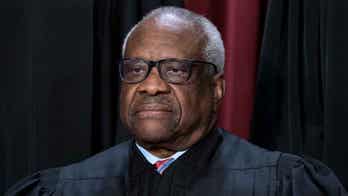
President Barack Obama waves to the audience at the Ford Michigan Assembly Plant in Wayne, Mich., Wednesday, Jan. 7, 2015. (AP)
President Obama threw himself back onto the campaign trail this week as he tried to shift the spotlight away from the flurry of activity on Capitol Hill under the new GOP majority, as Republicans and Democrats alike scrambled to round up votes to override a threatened veto on key legislation.
The White House has issued three veto threats in the opening days of the new Congress, including over a bill approving the controversial Keystone oil pipeline. Sponsors are trying to rally bipartisan support in preparation for a showdown with the president.
Meanwhile, Obama has drawn GOP criticism that he already is missing the chance to work with the 114th Congress, as he churns through a three-state tour in the run-up to his Jan. 20 State of the Union address. He touted the auto industry's resurgence at a Ford assembly plant in Michigan on Wednesday and on Thursday spoke in Phoenix about the housing market.
Republicans bristled at the president's familiar cross-country touring, as they charged ahead with their own agenda in Congress.
"As Americans continue to struggle, President Obama would rather go around the country saying what a good job he thinks he's doing than get to work with the new Congress solving problems," Republican National Committee Chairman Reince Priebus said in a statement. "The new Congress is barely a day old and already the president is saying 'no' to bipartisan jobs proposals."
Priebus was referring to the president's threatened veto of the bill forcing approval of the Canada-to-Texas Keystone pipeline, as well as another increasing the definition of a full-time worker who must be offered health coverage at work to 40 hours from the current 30.
Republicans argue the health law's 30-hour requirement is encouraging companies to cut workers' hours. But the White House said in a statement there is no evidence the law has caused a broad shift to part-time work, and said the new measure would create incentives for companies to shift employees to part-time work.
The White House on Wednesday also said Obama would veto legislation that would give U.S. banks until 2019, a delay of two years, to get rid of some high-risk investments. The measure won a 276-146 majority, with 35 Democrats in favor, but failed under House rules requiring a two-thirds vote. It's likely to pass soon under rules that require a simple majority.
The White House did not mention the veto threat publicly until after the bill failed.
On Wednesday, top Senate Republican leaders -- who took control of the chamber this week -- blasted Obama for the early veto threats.
"Threatening to veto a jobs and infrastructure bill within minutes of a new Congress taking the oath of office -- a bill with strong bipartisan support -- is anything but productive," Senate Majority Leader Mitch McConnell, R-Ky., said.
McConnell's top lieutenants echoed his concerns, with Senate Majority Whip John Cornyn, R-Texas, calling the "premature" veto threats "deeply irresponsible and troubling."
On Thursday, House Democratic Leader Nancy Pelosi claimed her caucus would be able to sustain all three of the early vetoes.
Amid the veto politics, Obama on Thursday touted economic improvements under his watch while unveiling new policies meant to spur further growth.
"It's not just the economy turning around. It's turning around the lives of hard-working people," Obama told the crowd in Phoenix. "America is coming back."
Under a housing proposal announced as Obama was flying to Michigan, the Federal Housing Administration will cut annual mortgage insurance premiums by 0.5 percentage point, to 0.85 percent. The White House said the reduction means new home buyers and those who refinance with FHA would pay $900 less a year than they would otherwise, in a bid to help more Americans own their own homes.
The premium rate reduction was a centerpiece of Obama's speech on Thursday before Obama finishes his trip Friday in Tennessee, where he is expected to tout the state's new policy to pay for community college tuition.
All three issues are expected to play central roles on Obama's annual address to Congress, scheduled this year for Jan. 20.
A recent flurry of aggressive executive actions on domestic and foreign policy have energized the West Wing. With the economy growing and his approval rating creeping upward, Obama is searching for ways to prevent this spurt of momentum from being more than just a blip on the radar of his presidency's waning years.
Obama plans to meet with leaders of the new Congress next week.
"I'm confident there are going to be areas where we disagree and there will be some pitched battles," Obama said of the new GOP leadership, though he added that he was hopeful for a "productive 2015."
The Associated Press contributed to this report.




